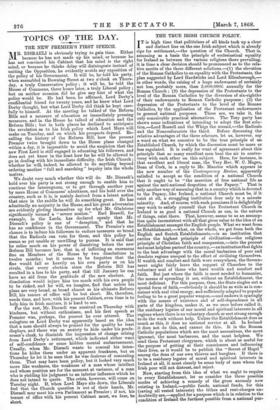TOPICS OF UTE DAY.
THE NEW PREMIER'S FIRST SPEECH.
MR. DLSRAET,T is obviously trying to gain time. Either because he has not made up his mind, or because he has not convinced his Cabinet that his mind is the right mind, or because he thinks delay will disintegrate instead of uniting the Opposition, he evidently avoids any exposition of the policy of his Government. It will be, he told his party, when assembled in Downing Street at two o'clock on Thurs- day, a truly Conservative policy ; it will be, he told the House of Commons, three hours later, a truly Liberal policy ; but on neither occasion did he give any hint of what the policy would be. He had been, he affirmed, Lord Derby's confidential friend for twenty years, and he knew what Lord Derby thought, but what Lord Derby did think he kept care- fully to himself. At the meeting he talked of the Reform Bills and a measure of education as immediately pressing measures, and in the House he talked of education and the Reform Bills ; but in both places he declined to anticipate the revelation as to his Irish policy which Lord Mayo will make on Tuesday, and on which his prospects depend. Re- calling the history of the Reform Bill, how the present Premier twice brought down to the House plans changed within a day, it is impossible to avoid the suspicion that the new First Lord is still engaged in educating his followers, and does not yet know in the least how far he will be allowed to go in dealing with his immediate difficulty, the Irish Church ; whether he will, indeed, be allowed to do anything beyond ordering another "full and searching" inquiry into the whole matter.
We doubt very much whether this will do. Mr. Disraeli's hold over his party is not strong enough to enable him to continue the interregnum, or to get through another year by mere House of Commons' adroitness, and his hold over the country, such as it is, is mainly derived from a latent notion that once in the saddle he will do something great. He has admittedly no majority in the House, and his great adversaries are evidently girding themselves up for what Mr. Gladstone significantly termed a "severe session." Earl Russell, for example, in the Lords, has declared openly that Mr. Disraeli's policy is one of "deception," and that he has no confidence in the Government. The Premier's one chance is to induce his followers to endure measures so broad that the Radicals can vote for them, and this policy he seems as yet unable or unwilling to pursue. It is said that he relies much on his power of dissolving before the new Reform Bill becomes law, that is, of inflicting an enormous fine on Members of the House by two dissolutions in twelve months ; but it seems to be forgotten that the fine would fall as heavily on his own party as on his rivals, that every election since the Reform Bill has resulted in a loss to his party, and that till January he can have no aid from the gratitude of the new electors. A dissolution would injure him too much with his own people to be risked, and he will, we imagine, find that unless his plans are very broad, as broad almost as his ultimate Reform Bill, his tenure of office will be but short. He, therefore, needs time, and how, with his present Cabinet, even time is to help him in Irish matters, it is hard to see. For the rest, Mr. Disraeli was received on Thursday with kindness, but without enthusiasm, and his first speech as Premier was, perhaps, the poorest he ever uttered. The eulogium on Lord Derby was apparently based on the idea that a man should always be praised for the quality he least displays, and there was an anxiety to hide under his prede- cessor's cloak, to diminish the impression of change arising from Lord Derby's retirement, which indicated either want of self-confidence or some hidden mental embarrassment. Usually, when Mr. Disraeli wants to conceal his inten- tions he hides them under an apparent frankness, but on Thursday he let it be seen that he was desirous of concealing them. That may have been policy, but it looked very much more like weakness, the weakness of a man whose intellect and whose position are for the moment at variance, of a man who is yielding his judgment to an inferior influence which he does not intend to quote. The crisis, however, will come on Tuesday night. If, when Lord Mayo sits down, the Liberals feel that the Church question is out of their hands, Mr. Disraeli may meet his own Parliament as Premier ; if not, his tenure of office with his present Cabinet must, we fear, be short.


































 Previous page
Previous page